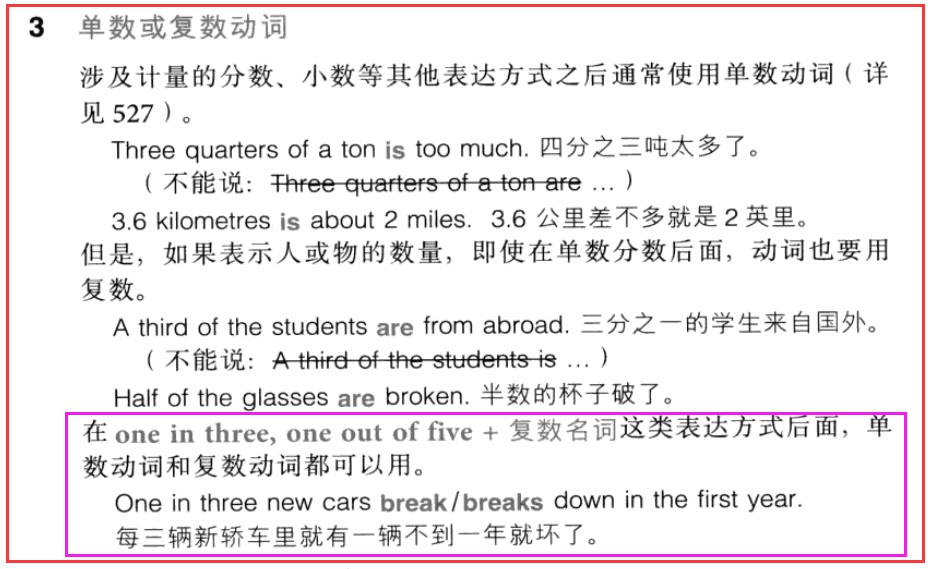2 1 in 5作主语时的主谓一致问题
According to a new study from market analysts, 1 in 5 Britons say that watching cookery programmes on TV has encouraged them to try different food. Almost one third say they now use a wider variety of ingredients (配料) than they used to, and just under 1 in 4 say they now buy better quality ingredients than before. One in four adults say that TV chefs have made them much more confident about expanding their cookery knowledge and skills, and young people are also getting more interested in cooking. The UK’s obsession (痴迷) with food is reflected through television scheduling. Cookery shows and documentaries about food are broadcast more often than before. With an increasing number of male chefs on TV, it’s no longer “uncool” for boys to like cooking.
上面一段摘自2023年高考英语(老高考)全国卷1的阅读理解C。
请问:1 in 5 Britons 作主语,后面的谓语动词为什么用复数say而不用单数says?作主语的不是1吗?
其它 1 个回答
比较赞成胡老师对one in five Britons的分析思路。
这里的one in five应解释为比例,也可以将其转化为百分比。阅读原文那句,似可这样说:
One fifth/20% of the Britons say…(应该不是说所有英国人里的百分比,应该是所限定的一定数量的那些英国人)
总数应该不是仅五个人,其中一个人说,如果那样,似应这样:
One of the five Britons says…
所以这里的one in five Britons从逻辑语意来说,是复数意义,根据主谓一致的概念一致原则,用复数谓语动词应该是比较合理的。
但是,有时也用单数谓语动词,可能是受语法一致原则的影响,因为one in five Britons的中心词是one。
这样的矛盾情况也不乏其例,many a和more than one接单数名词作主语时,按照语法一致原则处理,但是与概念一致原则是有矛盾的。例如:
1 Many a student wants to take holidays abroad. (语意为复数,用了单数谓语动词)
2 More than one member has protested against the proposal.(同理)
所以,语意上虽为复数,应用复数谓语动词。但是,出于语法结构形式上的影响,也用单数谓语动词。PEU截图上的先复数后单数的排序,似乎在暗示些什么。
仅供参考。
- 1 关注
- 2 收藏,4435 浏览
- 徐海梅 提出于 2023-10-20 08:10
相似问题
- 集合名词的主谓一致问题 0 回答
- 不定式作主语可以连用复数动词吗 1 回答
- 涉及 committee 的主谓一致 1 回答
- 主谓一致关系 1 回答
- father and son作主语时谓语动词可以用单数吗 1 回答
- a queue of…作主语时谓语动词用单数还是复数 1 回答
-
 《高考英语备考1号·速效编》
《高考英语备考1号·速效编》
-
 《高考英语备考1号·写作编》
《高考英语备考1号·写作编》
-
 《高中英语晨读晚记》
《高中英语晨读晚记》
-
 《高中英语错题笔记》
《高中英语错题笔记》
-
 《零起点考大学英语》
《零起点考大学英语》
-

